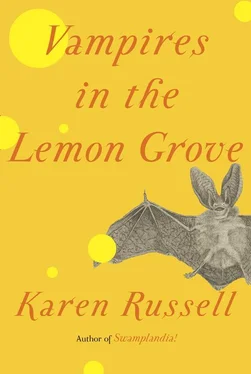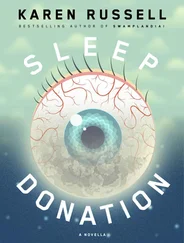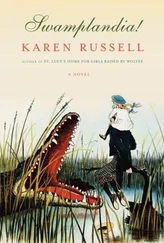They searched my apartment, found nothing. No white hands clapping in my closet or anything. No stuffed legs propped next to the brooms in the kitchen.
“He’s clean,” shrugged Gus, talking over me. “He probably buried the evidence.”
“I do think we need to bury him,” I started babbling. “We could go down there, dig the doll a deeper hole.” I swallowed, thinking about his face in the mud. “Please, guys—”
“No way. We are not falling for that ,” said Juan Carlos quickly, as if wary of falling into the Cone himself.
Accusing me, I saw, served a real utility for the group — suddenly nobody was interested in researching scarecrows at the library with me, or trying to figure out where the real Eric Mutis had gone, or deciphering who was behind his doppelgänger doll. They had their answer: I was behind it. This satisfied some scarecrow logic for my friends. They slept, they didn’t wonder anymore. That’s where my friends had staked me: behind the doll.
“Let’s go there one night, and just see who comes to shred and tear at him like that. Whatever comes for Mutant, we’ll scare it off.” I swallowed hard, staring at them. “And then we’ll know exactly …”
Mondo snapped the TV on.
It felt like we sat in the dark for hours, the silence growing and leafing into suffocating densities above us, sinking around the sofas like tree roots. Nobody but me seemed to notice when the television station switched to pure static. My ma had an ancient RCA TV, with oven dials for controls and rabbit ears; I always thought it looked more authentically futuristic than my friends’ modern Toshiba sets. Spazzy rainbows moved up and down, imbuing the screen with an insectoid life of its own. Here was the secret mind of the machine, I thought with a sudden ache, what you couldn’t see when the news anchors were staring soulfully at their teleprompters and the sitcom families were making eggs and jokes in their fake houses.
Eric’s face — the face of scarecrow Eric — swam up in my mind. I realized that the random, relentless lightning inside the TV screen was how I pictured the interior of the doll — void, yet also, in a way that I did not understand and found I could not even think about head-on, much less explain to my friends, alive . Rainbows furrowed the glass. With the TV on mute you could hear a hard clock tick.
“Hey! Rubio!” Gus finally asked. “What the fuck we watching?”
“Nothing,” I snapped back; a wise lie, I thought. “Obviously.”
Over the next three days, the doll continued to disappear. Once the major appendages were gone, the increments of Eric that went missing became more difficult to track. Patches of hair vanished. Bites and chews of his shoulders. Morsels. By Monday, two weeks after we’d found it, over half the scarecrow was gone.
“Well, that’s that,” said Juan Carlos in a funny voice. In the Cone, green straw was blowing everywhere now. All that bodiless straw gave me a nervous feeling, like watching a thought that I couldn’t collect. Eric’s head was still attached to the sack of his torso.
“That’s all, folks,” echoed Gus. “Going once, going twice! Nice work, Rubby.”
I leaned against the oak, feeling nauseated. With a sickening lurch, I understood that we were never going to tell anyone about Eric. Nobody who saw the wreck in the Cone would believe our story. Why hadn’t we gotten the police when we first found the scarecrow, or even Vice Principal Derry? Even yesterday that had still been an option, but today it wasn’t; we all felt it; we hadn’t acted, and now the secret was returning to the ground. Eric Mutis was escaping us again in this terrible, original way.
That Friday, the scarecrow’s head was gone. Now I thought I detected a ripple of open fear in the others’ eyes. All the laughter about my “prank” died out.
“Where did you put it?” Mondo whispered.
“When are you going to stop?” said Juan Carlos.
“Larry,” Gus said sincerely, “that is really sick.”
Hypothesis 4.
“I think we made him,” I told Chu on the phone. “Eric’s scarecrow. I don’t know how, exactly. I mean I know we didn’t stitch him up or anything, but I think that we must be the reason …”
“Quit acting nuts. I know you’re faking, Larry. Gus says you probably made him. My dinner’s ready—” Mondo hung up.
ABOUT THAT STATIC — sometimes that was all I saw in the real Mute’s eyes. Just a random light tracking your fists back and forth. Two blue-alive-voids. When we laid him flat in the weeds behind the Science Building, it was that emptiness that made us wild. I hit Mutant so hard that I could feel myself split — it was the strangest feeling, as if I was inside two bodies at once, my own and the Mute’s lying prone beneath me. Cringing under the blows of my own knuckles. I couldn’t stop hitting him, though — I was afraid to. I’d wake up, or he would, and then the pain would really begin. Somehow I swear it really did feel like I had to keep hitting him, to protect the both of us from what was happening. Out of the red corner of one eye I could see my wet fist flying. The slickness on it was our snot and our blood.
Only one time did anybody succeed at stopping us.
“Leave him alone,” called a voice that we immediately recognized. We all turned. Eric Mutant breathed quietly through his mouth in the weeds below us.
“You heard me.” This was Mrs. Kauder, our school librarian. She walked briskly toward us across the never-mowed grass. A woman well past middle age, whose red-lipped face and white hair made her shockingly attractive to us. Here she came like a leopardess, flaunting all her bones.
J.C. surreptitiously wiped Eric’s blood onto his own sleeve. Now we could credibly asseverate, to the librarian or to Coach Leyshon or to Vice Principal Derry, that our assault on Eric Mutis had been a fight. But the school librarian saw right through him. The school librarian fixed her green eyes on each one of us — except for Eric, she had known every one of us since elementary school. I felt a sudden, thrilling shame as her gaze covered me.
“Larry Rubio,” she said, in a neutral voice, as if she were remarking on the weather. “You are better than this.
“Now you go back to your classrooms,” she said, in this funny rehearsed way, as if she were reading our lives to us from one of her books.
“Now you go to Geometry, Gus Ainsworth—” She pronounced our real names so gently, as if she were breaking a spell.
“Now you go to Spanish, Juan Carlos Diaz and Mondo Chu—
“Now you go to Computers, Larry Rubio …” Her voice was as nasal as Eric’s but with an old person’s polished tremble. It was a terribly embarrassing voice — a weak white grasshopper species that we would have tried to kill, had it belonged to a fellow child.
“Remember, boys,” the librarian called after us. “I know you, and you know better. You are good boys,” she insisted. “You have good hearts.
“Now you , Eric Mutis,” I heard her saying softly. “You come with me.”
I remember feeling jealous — I wanted to go with Mrs. Kauder, too. I wanted to sit in the dark library and hear my name roll out of her red mouth again, like it was the Spanish word for something good. I think we needed that librarian to follow us around the hallways for every minute of every school day, reading us her story of our lives, her fine script of who we were and our activities — but of course she couldn’t do this, and we did get lost.
ON SATURDAY, I convinced Mondo to meet me in Friendship Park. We were alone — Juan Carlos was working as a Food Lion bag boy, and Gus was out with some chick.
Читать дальше












